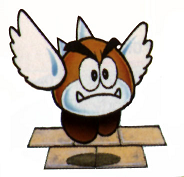Para-Goomba (Mario Clash): Difference between revisions
From the Super Mario Wiki, the Mario encyclopedia
Jump to navigationJump to search
LinkTheLefty (talk | contribs) (https://www.virtual-boy.com/magazines/club-nintendo-mx/club-nintendo-09-1995/) |
m (Text replacement - "(\| *)Jap([RMCN\d]* *=)" to "$1Jpn$2") |
||
| (16 intermediate revisions by 14 users not shown) | |||
| Line 1: | Line 1: | ||
{{italic title|id=yes}} | {{italic title|id=yes}} | ||
{{species infobox | {{species infobox | ||
|image=[[File:MC-Paragoomba Artwork.png| | |image=[[File:MC-Paragoomba Artwork.png|184px]]<br>Artwork from ''Mario Clash'' | ||
|first_appearance=''[[Mario Clash]]'' ([[List of games by date#1995|1995]]) | |first_appearance=''[[Mario Clash]]'' ([[List of games by date#1995|1995]]) | ||
|latest_appearance=''[[WarioWare Gold]]'' ([[List of games by date#2018|2018]]) | |latest_appearance=''[[WarioWare Gold]]'' ([[List of games by date#2018|2018]]) | ||
|variant_of=[[ | |variant_of=[[Paragaloomba]] | ||
}} | }} | ||
'''Para-Goombas'''<ref name=English>''Mario Clash'' | '''Para-Goombas'''<ref name=English>{{cite|language=en-us|publisher=Nintendo of America|date=1995|title=''Mario Clash'' instruction booklet|page=21}}</ref> (or '''Para-Goombahs''')<ref>''Mario Clash'' English back cover</ref> are [[Paragaloomba|Flying Goomba]]s with [[Spike (obstacle)|thorn]]s on their heads that protect them from [[jump]] attacks. They appear in ''[[Mario Clash]]'', where they slowly hop along the ground, very similar to the [[Fighter Fly|Fighter Flie]]s from ''[[Mario Bros. (game)|Mario Bros.]]'' To defeat them, [[Mario]] must hit them with a [[Green Shell|Turtle Shell]] at their sides from the background or foreground to stun them, then hit them again or kick them. A Para-Goomba appears in the [[Mario Clash (microgame)|Mario Clash]] [[microgame]] in ''[[WarioWare, Inc.: Mega Microgame$!]]'' and ''[[WarioWare Gold]]''. | ||
==Profiles== | |||
==Profiles | {{Multilang profile | ||
|type=manual | |||
|Jpn=ジャンプしているので当てにくい。よくねらって投げよう。<ref name=Japanese/> | |||
|JpnM=It is difficult to hit because it is jumping. Aim carefully and throw. | |||
|Eng=This enemy jumps, making it hard to hit with a shell, so aim well.<ref name=English/> | |||
}} | |||
==Gallery== | ==Gallery== | ||
<gallery> | <gallery> | ||
MC Para-Goomba.png|Sprite | MC Para-Goomba.png|Sprite from ''Mario Clash'' | ||
WWIMM Mario Clash Para-Goomba.png|Sprite from ''WarioWare, Inc.: Mega Microgame$!'' | |||
WWG Mario Clash Para-Goomba.png|Sprite from ''WarioWare Gold'' | |||
</gallery> | </gallery> | ||
==Names in other languages== | ==Names in other languages== | ||
{{foreign names | {{foreign names | ||
| | |Jpn=ツンパタクリ<ref name=Japanese>{{cite|format=JPG|url=files.virtual-boy.com/manual/956714/mc_jpn_im_21.jpg|title=マリオクラッシュ (''Mario Kurasshu'') instruction booklet|page=19|publisher=Nintendo|date=1995|language=ja}}</ref> | ||
| | |JpnR=Tsun Pata Kuri | ||
| | |JpnM=Portmanteau of「ツンと」(''tsunto'', a Japanese term for "prickly") and「パタクリ」(''Pata-Kuri'', "[[Paragaloomba]]"); may incorporate「ツノゾー」(''Tsunozō'', "[[Thorny]]") | ||
|Spa=Goomba<ref>''Club Nintendo'' AÑO 4 No. 9 | |Spa=Goomba<ref>{{cite|title=''Club Nintendo'' (Mexico) AÑO 4 No. 9|page=20}}</ref> | ||
}} | }} | ||
| Line 34: | Line 37: | ||
{{Mario Clash}} | {{Mario Clash}} | ||
[[Category:Galoombas]] | [[Category:Galoombas]] | ||
[[Category:Mario Clash enemies]] | [[Category:Mario Clash enemies]] | ||
[[it:Para-Goomba]] | [[it:Para-Goomba]] | ||
Latest revision as of 15:13, January 7, 2025
| Para-Goomba | |
|---|---|
 Artwork from Mario Clash | |
| First appearance | Mario Clash (1995) |
| Latest appearance | WarioWare Gold (2018) |
| Variant of | Paragaloomba |
Para-Goombas[1] (or Para-Goombahs)[2] are Flying Goombas with thorns on their heads that protect them from jump attacks. They appear in Mario Clash, where they slowly hop along the ground, very similar to the Fighter Flies from Mario Bros. To defeat them, Mario must hit them with a Turtle Shell at their sides from the background or foreground to stun them, then hit them again or kick them. A Para-Goomba appears in the Mario Clash microgame in WarioWare, Inc.: Mega Microgame$! and WarioWare Gold.
Profiles[edit]
- Instruction booklet description:
Gallery[edit]
Names in other languages[edit]
| Language | Name | Meaning | Notes |
|---|---|---|---|
| Japanese | ツンパタクリ[3] Tsun Pata Kuri |
Portmanteau of「ツンと」(tsunto, a Japanese term for "prickly") and「パタクリ」(Pata-Kuri, "Paragaloomba"); may incorporate「ツノゾー」(Tsunozō, "Thorny") | |
| Spanish | Goomba[4] | - |
References[edit]
| Mario Clash | |
|---|---|
| Characters | Bowser • Donkey Kong • Donkey Kong Jr. • Luigi • Mario • Peach • Toad • Wario • Yoshi |
| Items | Coin • Mushroom |
| Enemies and obstacles | Big Boo • Fire • Ice (terrain) • Ice (falling object) • Koopa • Lobb • Para-Goomba • Pokey • Sidestepper • Snake • Spike • Thorny |
| Miscellaneous | Clash House • Gallery • Staff |


